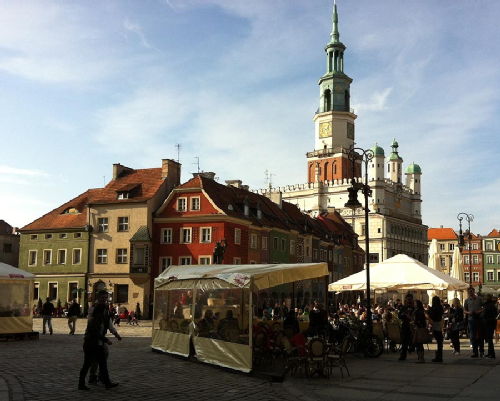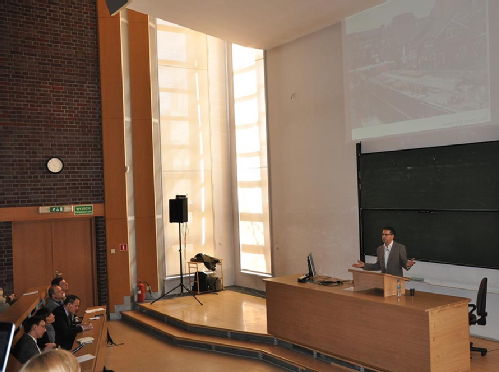Official visit to AMU Poznan

In autumn of last year the Centre was visited by Dr Marcin Poprowski of the Institute of Cultural Studies, Adam Mickiewicz University (AMU) of Poznan, Poland. I was similarly invited to Poland, and with a welcome letter from the Mayor Ryszard Grobelny spent the week starting the 4th of April on an official academic visit. The AMU is often quoted as the third most prestigious university in the country, so I was intrigued as to what I would find. I had been on the organization committee of a conference hosted in Krakow about 6 years ago, but my knowledge of Poland has remained limited. This visit became something of a crash course in the history and culture of Poland seen through the lens of historic Poznan. Marcin had investing a lot of time in organizing my week, and I am grateful for what was an extraordinary and productive time.
Poznan is a city about half the size of Birmingham in terms of population, yet with what, in my estimation, is double the investment in culture. I arrived on the Sunday and immediately taken on a quick-stop afternoon tour around the city by Marcin, from the main city plazas, institutions and palaces, grand churches and the cathedral area, site of a would-be artist’s quarter. The Monday morning began with an introduction to one of the campuses of AMU and the person of Prof. Jacek Sójka, who is the head of the Institute. The morning was the occasion of my main public lecture (see picture below). The audience included the deputy mayors for culture and economic development (who both asked pertinent questions), as well as cultural sector people and a lot of students or staff connected to Marcin. My lecture was called (rather over-adventurously) ‘Cultural Strategy and Economic Development: challenges for the European City’. The challenge for this lecture was that I had little advance knowledge of the audience (being open to the ‘public’), so I made sure I had lots of images and examples and built the talk about some big issues. The main argument of the paper was that the dominant model of city development in Europe in the last 20 years (in Western Europe, inherited and now in question for the post-communist East) has confused business development with economic development. Put another way, the concept of ‘economy’ has become synonymous with profit-making business and industry. I discussed this through various examples of ‘creative city’, creative class and other models of ‘new economy’ development in European cities, arguing for an understanding of economy based on a broader concept of capital. Here, culture helps us understand, among other things, the complexity of the nature of capital, particularly in cities.
Further departmental meetings were followed by another tour of the city. In the evening I was the guest speaker at a city association called Bona Fide, of which Marcin is a member. The association is a group of young professionals in Poznan, and who asked me to give a talk on ‘The Visual Dimensions of a City’. It was a great meeting, ending around 10:30pm. On Tuesday Marcin made possible a long meeting with Dariusz Jaworski the Deputy Mayor for culture, sport and education, in the grand City Hall buildings. Dariusz, though young, was an eminent journalist, now attempting to spearhead a strong cultural agenda in the city. After my public lecture the day before I was handed a number of City Hall publications on urban development and city cultural planning (all in English). The level of organization as well as aspiration for the city was quite impressive. Another afternoon saw me explore the city’s cultural institutions and architecture, camera in hand, paying particular attention to the war memorials. Late afternoon I addressed Marcin’s masters students on the creative economy in Europe, particularly in the light of their career interests and working. The day ended with a concert by the HalasTrio (Polish Folk) in a place called the Dragon Club, a fascinating cultural space created within a series of converted town houses.
During the rest of the week I visited other cultural organisations, such as the impressive Zamek Cultural Centre, who are not core-funded by the city but manage to sustain a significant and adventurous breadth of cultural activities engaged with the city. The Concordia Design Centre are also self-sustaining, and operate as a design, research and planning unit, housing a series of incubator spaces, start-up businesses, a large printing business, a bar and restaurant. I also gave an interview for a city newspaper – interested in my views on changing contemporary Poznan. My last appointment was a slightly unnerving TV interview by an independent media production company: it was filmed on top of the highest building in Poznan, to give that ‘metropolis’ effect. Once finished, I was invited in to meet and talk with one of Poznan’s top business executives (of the Von Der Heyden Group, whose offices were just below) offering me a pragmatic property developer’s view on the city (on the relation between construction cranes, urban policy-making pychology and the dangers of full employment!). This was the end of an equally exhausting and fascinating week, with many discussions on collaboration and the future of cultural policy research in Europe Marcin and I hope to develop…..

 Jonathan Vickery
Jonathan Vickery


 Loading…
Loading…
Add a comment
You are not allowed to comment on this entry as it has restricted commenting permissions.